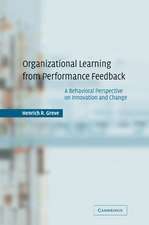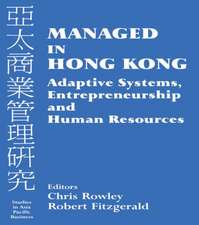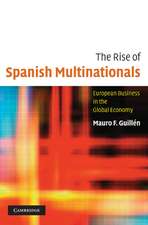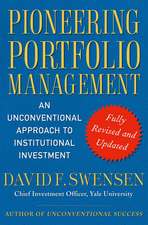Remaking Management: Between Global and Local
Editat de Chris Smith, Brendan McSweeney, Robert Fitzgeralden Limba Engleză Paperback – 16 feb 2011
| Toate formatele și edițiile | Preț | Express |
|---|---|---|
| Paperback (1) | 433.02 lei 6-8 săpt. | |
| Cambridge University Press – 16 feb 2011 | 433.02 lei 6-8 săpt. | |
| Hardback (1) | 908.08 lei 6-8 săpt. | |
| Cambridge University Press – 7 mai 2008 | 908.08 lei 6-8 săpt. |
Preț: 433.02 lei
Nou
Puncte Express: 650
Preț estimativ în valută:
82.87€ • 89.98$ • 69.61£
82.87€ • 89.98$ • 69.61£
Carte tipărită la comandă
Livrare economică 22 aprilie-06 mai
Preluare comenzi: 021 569.72.76
Specificații
ISBN-13: 9780521172806
ISBN-10: 0521172802
Pagini: 488
Dimensiuni: 170 x 244 x 25 mm
Greutate: 0.77 kg
Editura: Cambridge University Press
Colecția Cambridge University Press
Locul publicării:Cambridge, United Kingdom
ISBN-10: 0521172802
Pagini: 488
Dimensiuni: 170 x 244 x 25 mm
Greutate: 0.77 kg
Editura: Cambridge University Press
Colecția Cambridge University Press
Locul publicării:Cambridge, United Kingdom
Cuprins
List of figures; List of tables; List of contributors; 1. Introduction - Remaking management: neither global nor national Brendan McSweeney, Chris Smith and Robert Fitzgerald; Part I. International and Comparative Management Theory: Preface - Dominance, diversity and the historical process in management practice Chris Smith, Brendan McSweeney and Robert Fitzgerald; 2. Work organisation within a dynamic globalising context: a critique of national institutional analysis of the international firm and an alternative perspective Chris Smith; 3. Cultural diversity within nations Brendan McSweeney; 4. Business systems, institutions and economic development: the value of comparison and history Robert Fitzgerald; Part II. Systems in Transition: Preface - System as Same and Different Brendan McSweeney; 5. The post-Socialist transformation and global process: knowledge and institution building in organisational settings Ed Clark; 6. The diffusion of HRM practices from the United Kingdom to China Jos Gamble; 7. Surviving through transplantation and cloning: the Swiss Migros hybrid, Migros-Türk Gul Berna Ozcan; Part III. Society as Open and Closed: Preface - Society and Comparative Differences Robert Fitzgerald; 8. Capitalism and Islam: Arab business groups and capital flows in South East Asia Rajeswary Ampalavanar Brown; 9. Challenges to the German theatrical employment system: how long established institutions respond to globalisation forces Axel Haunschild; 10. Between the global and the national: the industrial district concept in historical and comparative context Andy Popp; 11. Transnational learning and knowledge transfer: a comparative analysis of Japanese and US MNCs' overseas R&D laboratories Alice Lam; Part IV. The Search for Global Standards: Preface - dominance, best practice and globalisation Chris Smith; 12. The unravelling of manufacturing best-practice strategies Alan Pilkington; 13. Policy transfer and institutional constraints: the diffusion of active labour market policies across Europe Michael Gold; 14. Comparative management practices in international advertising agencies in the United Kingdom, Thailand and the United States of America Chris Hackley and Amy Rungpaka Tiwsakul; 15. Corporate social responsibility in Europe: what role for organised labour? Axel Haunschild, Dirk Matten and Lutz Preuss; 16. Can 'German' become 'international'? Reactions to globalisation in two German multinational corporations Fiona Moore; Index.
Recenzii
Review of the hardback: 'There are two very good reasons why, for all those interested in organisational change and the varieties of capitalism, this is a must buy. Firstly, it demonstrates the usefulness of a multi-level framework in which globalisation, varieties of capitalism and agency at the level of the organisation all matter. Secondly, by focusing on change at the company and workplace level, it provides much needed and up-to-date case studies to inform our teaching and research.' Jill Rubery, FBA, Professor of Comparative Employment Systems and Co-director of the European Work and Employment Research Centre, Manchester
Review of the hardback: 'What went wrong in the management sciences? For the contributors to Remaking Management - a lot. Too much blind faith in globalization as the universal agent for making the earth flat for capitalist markets. Too much exceptionalism - complexity cannot be reduced to national business recipes and local flavors. What's to be done? Complexity respected, multiple causalities traced, triggers and tipping points reconstructed, emergent agencies and astonishing blind spots laid bare. Identities matter, ideologies are flexible, social actors rehearse roles they have yet to imagine. This book reveals key aspects of change, complexity, and diversity in contemporary management ideologies and practices.' Slawomir Magala, Rotterdam School of Management, Erasmus University Rotterdam
'… the editors and the contributors present a theoretically informed, institutionally driven framework within which system and societal pressures may inhibit or reinforce dominance factors in the remaking of management best practice for work organisation and employment relations.' Ian Clark, Industrial Relations Journal
Review of the hardback: 'What went wrong in the management sciences? For the contributors to Remaking Management - a lot. Too much blind faith in globalization as the universal agent for making the earth flat for capitalist markets. Too much exceptionalism - complexity cannot be reduced to national business recipes and local flavors. What's to be done? Complexity respected, multiple causalities traced, triggers and tipping points reconstructed, emergent agencies and astonishing blind spots laid bare. Identities matter, ideologies are flexible, social actors rehearse roles they have yet to imagine. This book reveals key aspects of change, complexity, and diversity in contemporary management ideologies and practices.' Slawomir Magala, Rotterdam School of Management, Erasmus University Rotterdam
'… the editors and the contributors present a theoretically informed, institutionally driven framework within which system and societal pressures may inhibit or reinforce dominance factors in the remaking of management best practice for work organisation and employment relations.' Ian Clark, Industrial Relations Journal
Descriere
Remaking Management examines how organisations are responding to an increasingly complex commercial environment.




























